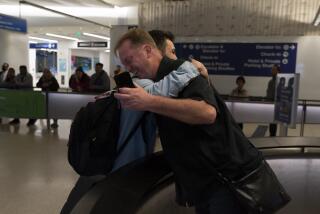Lindh Lawyers Offer New Account of Captivity
- Share via
WASHINGTON — Lawyers for John Walker Lindh, hoping to have their client’s alleged confession thrown out of court, released fresh details Wednesday about his captivity in Afghanistan that strongly suggest he was held under very harsh conditions when he agreed to talk to U.S. interrogators.
The Lindh defense team also asked a federal judge to subpoena a second American-born Taliban member who has been detained and who the Lindh lawyers hope might show that Lindh was not a terrorist fighting against the United States.
The lawyers have long complained that any statements that Lindh made after his arrest came only because he was mistreated and feared for his life if he did not cooperate.
The government, however, has maintained that Lindh, a 21-year-old who was raised in Northern California, volunteered to be interviewed by U.S. officials and that he was was not coerced.
In court papers filed Wednesday, defense lawyers said they want to interview seven U.S. service members who guarded Lindh in the days after his arrest.
A member of the Navy, for instance, reported to his superiors that Lindh “could not walk without assistance, passed out at least once and was given an IV because he was dehydrated,” the defense team said.
Another member of the Navy reported that he spoke with Lindh aboard the amphibious assault ship Peleliu and said Lindh “was nervous because of past experiences.” The guard said Lindh “required a wheelchair when he arrived on [the] USS Peleliu ... and that he had frostbite and shrapnel on his feet.”
The defense said a third Navy member described how “Lindh was transported to the interview room on a stretcher, blindfolded, with his hands and legs restrained.” The guard added that “Lindh was still in restraints when he allegedly signed a waiver-of-rights form.”
A fourth Navy member said U.S. military personnel took “souvenir” photographs of Lindh in bondage. And a fifth said the military “broke with procedure” by selecting Lindh for criminal prosecution rather than keeping him with other detainees sent to the U.S. Naval Base at Guantanamo Bay, Cuba.
In addition, the defense said, a soldier and a Marine noted that Lindh was kept in freezing conditions at night, “immediately preceding and up through his interrogation by an FBI agent.”
On the issue of the second so-called American Talib, the Lindh lawyers want to interview Yaser Esam Hamdi to see whether he might corroborate their defense that Lindh was not a terrorist but a member of the Taliban fighting the Northern Alliance rather than the United States.
“Mr. Hamdi clearly has material and exculpatory testimony” that would help the Lindh defense, the lawyers said.
Hamdi was born in Baton Rouge, La., but soon afterward moved to Saudi Arabia with his parents, who were natives of that country. He too was captured fighting with the Taliban.
It was only recently that U.S. officials determined that Hamdi had dual U.S.-Saudi citizenship. He was then removed from Guantanamo Bay and taken to a military prison in Norfolk, Va.
Prosecutors have asked U.S. District Judge T.S. Ellis III to postpone a decision on whether the defense can speak with Hamdi until the judge rules on whether the defense also can speak with detainees in Guantanamo Bay.
But Lindh’s attorneys argued that since Hamdi has been moved out of Cuba, they should be allowed to interview him now.
More to Read
Sign up for Essential California
The most important California stories and recommendations in your inbox every morning.
You may occasionally receive promotional content from the Los Angeles Times.











